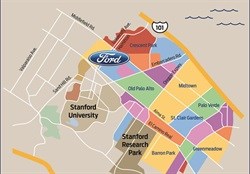
Top stories





Energy & MiningGlencore's Astron Energy gears up with new tanker amidst Sars dispute
Wendell Roelf 15 hours

More news
















Logistics & Transport
Uganda plans new rail link to Tanzania for mineral export boost











"At Ford, we view ourselves as both a mobility and an auto company, as we drive innovation in every part of our business," said Mark Fields, Ford president and CEO. "This new research centre shows our commitment to be part of the Silicon Valley innovation ecosystem - anticipating customers' wants and needs, especially on connectivity, mobility and autonomous vehicles. We are working to make these new technologies accessible to everyone, not just luxury customers."
The new research centre joins Ford's global network of research and innovation centres, including locations in Dearborn, Michigan, which focuses on advanced electronics, human-machine interface, materials science, big data and analytics; and Aachen, Germany, which focuses on next-generation power-train research, driver-assist technologies and active safety systems.
With the new facility, Ford expects to have one of the largest automotive manufacturer research centres in Silicon Valley by the end of the year, with 125 researchers, engineers and scientists. Located in Stanford Research Park, the facility also expands Ford's physical footprint - with further expansion planned in the near future. Ford opened its first Silicon Valley office in 2012.
Leading the new research centre is Dragos Maciuca, an engineer who joins Ford from Apple with a background in consumer electronics, semiconductor manufacturing, aerospace and automotive. As senior technical leader for innovation, Maciuca brings extensive Silicon Valley experience advising start-ups, developing and commercialising products, collaborating with universities and leading cross-functional teams.
Earlier this month, the company introduced Ford Smart Mobility at the 2015 International CES. It outlines the company's plans to accelerate innovation in connectivity, mobility, autonomous vehicles, customer experience and big data. The Palo Alto team plays a critical role in research and development in these areas.
"Future mobility solutions will require fresh ideas and vigorous collaboration between researchers inside Ford and with other technology leaders outside the automotive industry," said Raj Nair, Ford group vice president, Global Product Development and chief technical officer. "Our Palo Alto research team will build on existing relationships with universities and technology companies, and forge new ones to help us create and apply the appropriate technology working together."
"Growing the Palo Alto team will strengthen our global research prowess and drive innovation needed to meet the needs of our customers in the future," said Ken Washington, vice president of Ford Research and Advanced Engineering. "Working together with the Silicon Valley research community will spark the new ideas, products and services that will help Ford once again change the way the world moves."